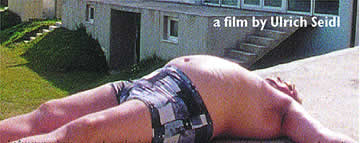 |
||
|
|
||
| DOG DAYS | ||
|
Nine Questions for Ulrich Seidl In 'Dog Days' you've got scenes infused literally with staggering and tormenting intensity. How do you get your actors to let go to such a degree? Seidl: I can't work with actors who just perform. I look for actors who I think are willing to bring their own lives into the roles and scenes. And another thing, I only work with actors I like and who I can connect with. As a director I see my job as creating an atmosphere that gives the actors on the set the opportunity to be real and a little bit private too. And then there's nothing an actor won't do? Seidl: Of course sometimes you have to force your actors to do something. When you shoot scenes where the effects of alcohol consumption play an important role, it just doesn't work for an actor not to drink alcohol. And you can't have a film take place in the most unbearable heat and not have actors really sweat. Do you overstep boundaries sometimes?And if so, which ones? Seidl: Are there any boundaries? What were you hoping for by working with a mixed ensemble of amateurs and professionals? And what actually came out in the end? Seidl: I don't differentiate between actors and non-actors. the main thing for me is being able to give an authentic portrayal of a social milieu. On my previous films I have had excellent experiences with non-actors in this respect. And in 'Dog Days' I wanted to take these experiences a step further in a purely fictional context. What we were aiming for was to create a film in which you couldn't tell the actors from the non-actors in the final cut. I think we succeeded. How would you typify your obvious interest in characters that are hard to watch? A moral interest? Aesthetic? Sadistic? Seidl: All wrong. And actually I don't' see my films
as hard to watch. Rather the question should be why is something in
the movies hard to watch? Do you differentiate between your artistic and private views of the world? Seidl: No. How important is the choice of location in respect to the stories you want to tell? Seidl: To me choosing the location is just as important as choosing the actors. I usually let myself be inspired by the conditions of real scenes. They can often influence the content of the film. One example: the final scene of the story with the divorced couple, the two of them swinging in the rain. This scene came about because there just happened to be a swing set in front of the house. And to be honest I didn't really pay much attention to it. But during the shoot itself the idea came to me to make this last scene.The ending of this story as it was in the script was completely different. Do you consider films that tell of lonliness, lack
of communication, Seidl: What is there to tell about happiness? Life isn't about happiness, or at most it's about the search for happiness and the disillusionment over not being able to find it or rarely find it. Maybe that's why our everyday lives are so infused with promises of happiness, they're at work everywhere - even in the most intimate spheres of our lives. And just look at the people on the streets. Apparently they're all happy. Do you cry at the movies? Seidl: Not just at the movies. | ||
